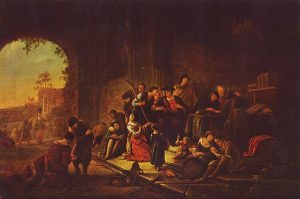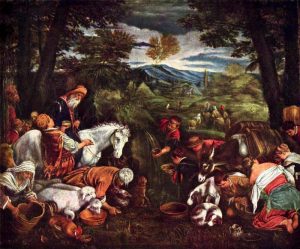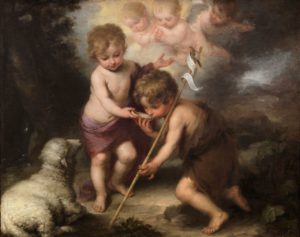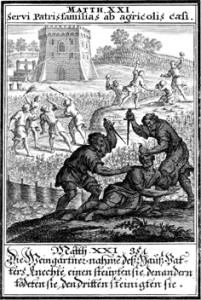Thoughts on Sunday’s Lessons for Sept. 24, 2023
First Reading (Track One): Exodus 16:2-15

Gleichnis von den Arbeitern im Weinberg (Parable of the workers in the vineyard, 17th century), painting on panel by Jacob Willemsz de Wet (1632–1675). Museum of Fine Arts, Budapest, Hungary. (Click image to enlarge.)
God showers us with abundant good, even when we have done nothing to deserve it: This is the gift of God’s amazing grace, and we hear about it throughout Sunday’s readings. In our first reading, the Israelites are in the wilderness. They may have been saved from the Egyptian army by God’s mighty hand at the Red Sea, but they are unhappy now, six weeks later, bitterly complaining because they have nothing to eat. They wish God had just killed them in Egypt, where at least they could eat their fill. But God provides, promising them meat in the evenings and bread in the mornings, which prove to be quail in the evenings and, in the mornings, the miraculous flaky manna that falls to the earth like dew.
First Reading (TrackTwo): Jonah 3:10-4:11
Last week we heard in Matthew’s Gospel about the parable of the king who forgave a slave’s debt – until that slave declined to forgive his debtor in turn. Now in the Hebrew Bible we find more insight into God’s desire to forgive. Jonah had fiercely resisted God’s call to prophesy to Israel’s ancient enemies in Nineveh until God sent him there, despite his refusal, via the famous giant fish. Arrived in the ancient capital of Israel’s Assyrian enemies, Jonah prophesied as ordered. Much to his surprise, the people of Nineveh changed their minds and gained God’s favor. Rather than being joyful, though, Jonah has an extended tantrum because God declined to destroy the city. “Just kill me now,” Jonah shouts. But God stands firm, choosing mercy and forgiveness over revenge on a city of 120,000 innocent people and all their animals.
Psalm (Track One): Psalm 105:1-6, 37-45
We read the first few verses of this same Psalm just three weeks ago. This Sunday, though, after the introductory praise to God’s holy name, we jump ahead to verses that remember Israel in the desert: The cloud and fire that led them; the quail and bread that fed them, and the water that flowed from the rock. All this is placed in the context of the covenant that God made with Moses and the people at Mount Sinai: God will give the people land and wealth. The people will follow God’s teaching and laws, living lives of righteousness and justice.
Psalm (Track Two): Psalm 145:1-8
Like a great symphony that ends with a mighty coda, the book of Psalms comes to a triumphant close with six joyous hymns of praise for God’s great glory. Psalm 145, which serves as a transition to that finale, reinforces the message that we heard in Jonah: The Psalmist exults in God’s righteousness, grace, generous mercy and steadfast love. We ponder the glorious splendor of God’s majesty and all God’s marvelous works, as the Psalmist exults in God’s righteousness, grace, generous mercy and steadfast love.
Second Reading: Philippians 1:21-30
After spending the past three months reading Paul’s letter to the Romans, we will now devote four Sundays to getting to know his letter to the people of Philippi. This was a Gentile community in Macedonia, Northern Greece, largely populated by the descendants of Roman soldiers. It was Paul’s first church in Europe, and his affection is apparent throughout the short letter. He is thought to have written this letter from prison in Rome, where his execution was a real possibility; and this may have inspired his reflections on life and death. If he lives, he says, he will take joy in continuing to spread the Gospel; but he is just as willing to die, for he understands death as being with Christ forever.
Gospel: Matthew 20:1-16
The parable of the workers in the field makes us stop and think, as the parables of Jesus are supposed to do. How would we feel if we had worked all day for our pay, only to see some other people who came in late and worked for only an hour getting the same amount as we had? Unfair! If we had stood on a street corner in a day-labor market, though, waiting for someone to offer us work, we’d probably be overjoyed at the unexpected generosity of our wage. God’s ways, as we see so often in Scripture, are not our ways. We all earn God’s grace in equal measure, no matter who we are or what we have done. What God gives to others takes nothing away from God’s gifts to us. We should joyfully celebrate God’s abundance, not jealously grumble about it.
What are “Track 1” and “Track 2”?
During the long green season after Pentecost, there are two tracks (or strands) each week for Old Testament readings. Within each track, there is a Psalm chosen to accompany the particular lesson.
The Revised Common Lectionary allows us to make use of either of these tracks, but once a track has been selected, it should be followed through to the end of the Pentecost season, rather than jumping back and forth between the two strands.



